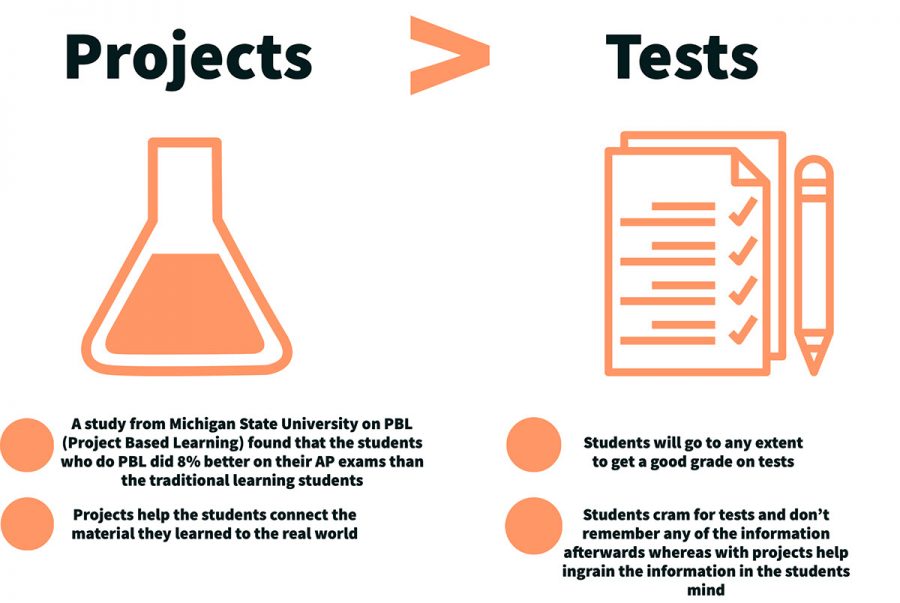Opinion: Projects help students learn more effectively than tests
September 1, 2021
For decades, American students have been showing up to tests with bleary eyes and frowning faces. Tests are intended to assess student knowledge, but after long nights of studying and meaningless memorization, little information is actually retained. Schools and teachers should start using projects instead of lectures and tests in order to teach students more efficiently.
As students sit through lectures, many don’t actually remember the material they learned during class. Oftentimes the students’ only priority is to pass the upcoming test by memorizing the material, and when the next assessment comes around, they’ve already forgotten the earlier information. Students will do anything to pass their tests, going as far as being dishonest and immoral, because they know they need a good grade.
Projects are a great solution for this problem. Projects help students connect the material they have learned to the real world, effectively helping the students understand what they learned.
While projects simulate real-world experiences, tests are artificial and don’t replicate any scenarios that one might encounter in the future. In the real world, to solve a problem you are able to collaborate with others and use previous resources, both of which are prohibited during tests. Also, students can receive feedback throughout the process of a project, whereas during tests, students have less incentive to actually pay attention to any feedback with their grade.
Projects also help students develop teamwork and communication skills. Working with others is an important skill, which lectures and tests simply do not teach. With projects, students can learn and grow as individuals while working with others to form a better understanding of the class material. The creativity of every individual can be utilized and shared to complete the assignment.
Many people might argue that tests help students memorize information, but that is not entirely true. The basis of tests is short-term memory. You study everything and cram it into your mind just to get the right answer the next day. Once the test has finished, you forget all the information and prepare for the next test.
On the other hand, projects not only help you understand the material but also help you retain the information. Earlier this year, I completed a research project in history class about Egypt. I can still remember and understand the information I learned about Egypt during that time. However, I can’t remember what I learned in math from two units ago because all we did was take notes and have a quiz.
Research also supports using projects instead of tests. Two separate studies were conducted by Michigan State University (MSU) along with the University of Southern California (USC) and the University of Michigan. In the studies, the pollers took either high school students or third graders and put them through a Project Based Learning (PBL) curriculum.
In the high school experiment conducted by MSU and USC, the researchers took 6,000 students in science and humanities from 114 schools and put them in PBL, 50% of which were from low-income households. The results found that the students in their first year of PBL did 8% better on their AP exams than the traditional learning students and 10% better in the second year of PBL.
The experiment with third-graders held similar results. Students in PBL performed 8% better than the traditional students did. Even though I am not arguing for a PBL curriculum, these studies do prove that students succeed more when projects are frequently included in their learning.
I am not arguing that all tests and exams need to be removed from schools, especially since standardized tests in English and math are required by federal law under the Every Student Succeeds Act. Nevertheless, schools can do more to help their students achieve success by using projects more frequently.
I urge teachers and administrators to reconsider their curriculums for the next school year and opt for more project-based assessments so that they can help their students succeed both in the classroom and in the future.









